莎士比亚十四行诗Sonnet精选版
莎士比亚十四行诗第十八首

莎士比亚十四行诗第十八首Sonnet 18 铁冰译文1 Shall I compare thee to a summer's day 我该不该把你比作怡人的夏天?2 Thou art more lovely and more temperate: 你却比她更加可爱更加温情。
3 Rough winds do shake the darling buds of May, 五月的娇蕊总是被狂风吹断,4 And summer's lease hath all too short a date: 夏天也只是一道短暂的美景。
5 Sometime too hot the eye of heaven shines, 苍穹的目光有时会过于灼热,6 And often is his gold complexion dimm'd; 那金色的脸庞也常黯淡无光。
7 And every fair from fair sometime declines, 人间一切瑰丽终将失去秀色,8 By chance, or nature's changing course, untrimm'd; 湮没于不测风云和世事沧桑。
9 But thy eternal summer shall not fade, 但是,你常青的夏季永不消逝,10 Nor lose possession of that fair thou owest; 你拥有的美丽也将永不折损,11 Nor shall Death brag thou wander'st in his shade, 或许死神的阴影会笼罩着你,12 When in eternal lines to time thou growest; 你却和这不朽的诗句千古长存。
13 So long as men can breathe, or eyes can see, 只要人类还在呼吸、眼睛还在欣赏,14 So long lives this, and this gives life to thee. 我的诗就会活着,令你生命绽放。
莎士比亚诗歌原文

莎士比亚的一首十四行诗:
我能否将你比作夏天?
你比夏天更可爱,更温和;
狂风将五月的蓓蕾凋残,
夏日的勾留何其短暂。
有时,太阳照得太热,
又匆匆从天边隐退,
给六月的天空蒙上阴影,
而它—你的永恒的夏天—
却不凋残,也不失去光华,
死神无法夸口你向他投降,
因为你俯视死亡和王国,
你的美永远在人间留存。
因此,幸福的你啊,
你拥有自己最美的春夭,
将天上的四季指使,
永恒的春天和秋天在你处。
世界啊,能欣赏你的文采,
就永远把你记在心头吧,
像你现在这样活在我的诗里,使我的诗歌在你的光芒里繁荣。
莎士比亚十四行诗精选带翻译
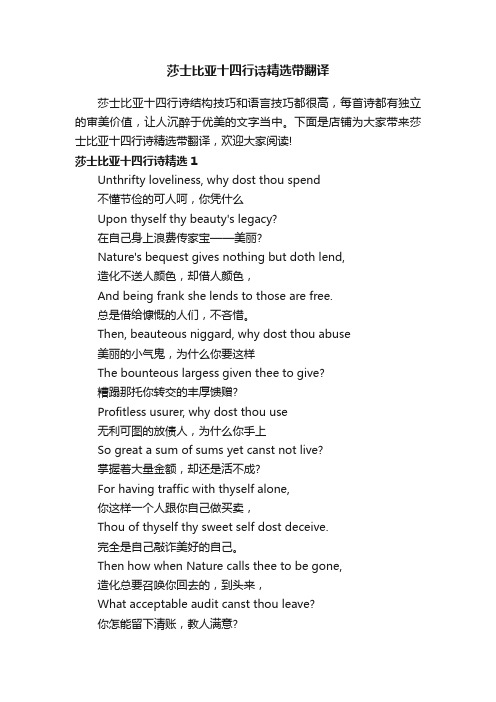
莎士比亚十四行诗精选带翻译莎士比亚十四行诗结构技巧和语言技巧都很高,每首诗都有独立的审美价值,让人沉醉于优美的文字当中。
下面是店铺为大家带来莎士比亚十四行诗精选带翻译,欢迎大家阅读!莎士比亚十四行诗精选1Unthrifty loveliness, why dost thou spend不懂节俭的可人呵,你凭什么Upon thyself thy beauty's legacy?在自己身上浪费传家宝——美丽?Nature's bequest gives nothing but doth lend,造化不送人颜色,却借人颜色,And being frank she lends to those are free.总是借给慷慨的人们,不吝惜。
Then, beauteous niggard, why dost thou abuse美丽的小气鬼,为什么你要这样The bounteous largess given thee to give?糟蹋那托你转交的丰厚馈赠?Profitless usurer, why dost thou use无利可图的放债人,为什么你手上So great a sum of sums yet canst not live?掌握着大量金额,却还是活不成?For having traffic with thyself alone,你这样一个人跟你自己做买卖,Thou of thyself thy sweet self dost deceive.完全是自己敲诈美好的自己。
Then how when Nature calls thee to be gone,造化总要召唤你回去的,到头来,What acceptable audit canst thou leave?你怎能留下清账,教人满意?Thy unused beauty must be tombed with thee,美,没有用过的,得陪你进坟墓,Which, used, lives th' executor to be.用了的,会活着来执行你的遗嘱。
莎士比亚十四行诗翻译和解读
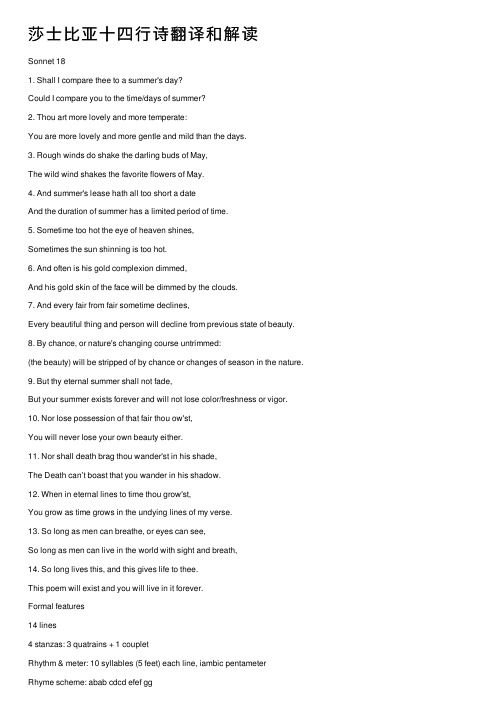
莎⼠⽐亚⼗四⾏诗翻译和解读Sonnet 181. Shall I compare thee to a summer's day?Could I compare you to the time/days of summer?2. Thou art more lovely and more temperate:You are more lovely and more gentle and mild than the days.3. Rough winds do shake the darling buds of May,The wild wind shakes the favorite flowers of May.4. And summer's lease hath all too short a dateAnd the duration of summer has a limited period of time.5. Sometime too hot the eye of heaven shines,Sometimes the sun shinning is too hot.6. And often is his gold complexion dimmed,And his gold skin of the face will be dimmed by the clouds.7. And every fair from fair sometime declines,Every beautiful thing and person will decline from previous state of beauty.8. By chance, or nature's changing course untrimmed:(the beauty) will be stripped of by chance or changes of season in the nature.9. But thy eternal summer shall not fade,But your summer exists forever and will not lose color/freshness or vigor. 10. Nor lose possession of that fair thou ow'st,You will never lose your own beauty either.11. Nor shall death brag thou wander'st in his shade,The Death can’t boast that you wander in his shadow.12. When in eternal lines to time thou grow'st,You grow as time grows in the undying lines of my verse.13. So long as men can breathe, or eyes can see,So long as men can live in the world with sight and breath,14. So long lives this, and this gives life to thee.This poem will exist and you will live in it forever.Formal features14 lines4 stanzas: 3 quatrains + 1 coupletRhythm & meter: 10 syllables (5 feet) each line, iambic pentameterRhyme scheme: abab cdcd efef ggStructure:1st – 2nd quatrains: an introduction to and development of a problem3rd quatrain: a volta or a turn “突转”(a change in direction, thought, or emotion)the couplet: a summary or conclusionThe theme:The main theme is t he power of the speaker’s poem to defy time and last forever, carrying the beauty of the beloved down to future generations.What is it about?The speaker opens the poem with a question addressed to the beloved: “Shall I compare thee toa summer’s day?” The next eleven lines are devoted to such a comparison. Summer: (Line 3: rough winds;4:too short;5. too hot;6. too dimmed;7&8. beautiful things will die) Sonnet 18 is the first poem in the sonnets not to explicitly encourage the young man to have children. The “procreation” sequence of the first 17 sonnets ended with the speaker’s realization that the young man might not need children to preserve his beauty; he could also live forever in this poem.Figures of speechIn line (5 ) There is a Metaphor .In line ( 5+6 ) There is a Personification .( eye of Heaven shines ) : Eye of heaven = the sunThe sun became dark because dark of clouds .In Line (9+10+12 ) There is a Hyperbole .In Line ( 11 )There is a personification .In Line ( 14 ) There is an Inverted order .Analysis: (拓展)The poem works at a rather curious level of achieving its objective through dispraise.The summer's day is found to be lacking in so many respects (too short, too hot, too rough, and sometimes too dingy), but curiously enough one is left with the abiding impression that 'the lovely boy' is in fact like a summer's day at its best, fair, warm, sunny, temperate, one of the darling buds of May, and that all his beauty has been wonderfully highlighted by the comparison.Sonnet 1301. My mistress' eyes are nothing like the sun;My lady’s eyes aren’t like the sun at all.2. Coral is far more red, than her lips red:Coral is much redder than her lips.3. If snow be white, why then her breasts are dun;If snow is white, then her breasts are brown.4. If hairs be wires, black wires grow on her head.If hair is as coarse as threads, then her hair is full of black threads.5. I have seen roses damasked, red and white,I have seen the pinkish, red and white roses.6. But no such roses see I in her cheeks;But I can see such kinds of roses in her cheeks.7. And in some perfumes is there more delightThere is much tempting/attractive fragrance.8. Than in the breath that from my mistress reeks.The fragrance is more attractive than her steamy, sweaty and unsavory smells.9. I love to hear her speak, yet well I knowI like listening to her speaking, but I am also aware that10. That music hath a far more pleasing sound:The sound of music is much more favorable than her sound.11. I grant I never saw a goddess go,I admit that I never saw a goddess walking by.12. My mistress, when she walks, treads on the ground:My mistress stamps on the floor when she walks.13. And yet by heaven, I think my love as rare,But I can swear to God that my lover is as precious as15. As any she belied with false compare.As any woman who has been misrepresented by ridiculous comparisons.Formal features14 lines4 stanzas: 3 quatrains + 1 coupletRhythm & meter: 10 syllables (5 feet) each line, iambic pentameterRhyme scheme: abab cdcd efef ggStructure:1st – 2nd quatrains: an introduction to and development of a problem3rd quatrain: a volta or a turn “突转”(a change in direction, thought, or emotion)the couplet: a summary or conclusionThemeThe poet suggests their love is rare because he does not desire her to be something she is not.It's about finding love in spite of (or maybe even because of) physical flaws.It pokes fun at our obsession with looks and to show how ridiculous it is to ask any person to live up to some ideal of perfect beauty.Figures of speechNegative similesSimile may also be expressed in the negative form“My mistress’ eyes are nothing like the sun”Etc.Ironic toneThe sonnet appears to be humorous, but the couplet displays the deeply romantic tone of the poem.Analysis(拓展)In many ways, Shakespeare’s sonnets subvert and reverse the conventions of the Petrarchan love sequence: the idealizing love poems, for instance, are written not to a perfect woman but to an admittedly imperfect man, and the love poems to the dark lady are anything but idealizing, like this one. He describes the woman that he loves in extremely unflattering terms but claims that he truly loves her, which lends credibility to his claim because even though he does not find her attractive, he still declares his love for her.Sonnet 1291. The expense of spirit in a waste of shameThe expenditure of sexual energy in a desert of shameful moral decay2. Is lust in action: and till action, lustIs the lust/letch acting: and before having sexual intercourse, lust3. Is perjured, murderous, bloody, full of blame,Is dishonest, murderous, violent and blameworthy with a lot of guilt.4. Savage, extreme, rude, cruel, not to trust;Barbaric, extreme, rude, cruel, and untrustworthy.5. Enjoyed no sooner but despised straight;As soon as lust has been enjoyed, it is hated.6. Past reason hunted; and no sooner had,Lust is pursued beyond the control of reason, as soon as lust is fulfilled,7. Past reason hated, as a swallowed bait,It is hated irrationally like a bait that a fish swallows8. On purpose laid to make the taker mad.(The bait) set on purpose to make the trapped creature react with frenzy.9. Mad in pursuit and in possession so;10. Had, having, and in quest to have extreme;The taker is insane in pursuing one's lust and mad in possessing the object of lust: going to extremes in having had it, in the having of it, and in seeking to have it;11. A bliss in proof, and proved, a very woe;A heavenly sensation while it is being experienced. Once you are done, it is a true sorrow.12. Before, a joy proposed; behind a dream.An expected joy exists before having it; after having it, it seems like a dream.13. All this the world well knows; yet none knows wellEveryone in the world knows it very well, but no one knows14. To shun the heaven that leads men to this hell.To avoid the tempting sense of delight which leads men to hell.Formal features14 lines4 stanzas: 3 quatrains + 1 coupletRhythm & meter: 10 syllables (5 feet) each line, iambic pentameterRhyme scheme: abab cdcd efef ggStructure:1st – 2nd quatrains: an introduction to and development of a problem3rd quatrain: a volta or a turn “突转”(a change in direction, thought, or emotion)the couplet: a summary or conclusionThemeAbout lust.–Lines 1-2: lust in action (shameful and wasteful...)–Lines 3-4: lust before action (dishonest, murderous, bloody…)–Lines 5-8: a comparison between lust before and after action (enjoyed vs.despised; both are past-reason / mad) – lust causes madness!–Lines 9-12: a comparison between lust before and after action. (bliss vs. woe;joy vs. dream) – lust causes sadness and disillusionment.–Lines 13-14: a conclusion.Figures of speechSimile: taker of lust as a hooked fishPersonification: lust as a personContrasts: "before" vs. "behind" (after), "heaven" vs. "hell," and so on.Analysis (拓展)The profound hatred of sexuality, sexual pessimismIts hatred of sexuality derives from the Christian imperative of the virginal life and the dislike of all bodily functionsIt gives essentially a phallo-centric view of sexImpersonal tone: The speaker never says outright that he is writing about his own experience; instead, he presents the poem as an impersonal description, a catalogue of the kinds of experience offered by lust.。
莎士比亚精选十四行诗
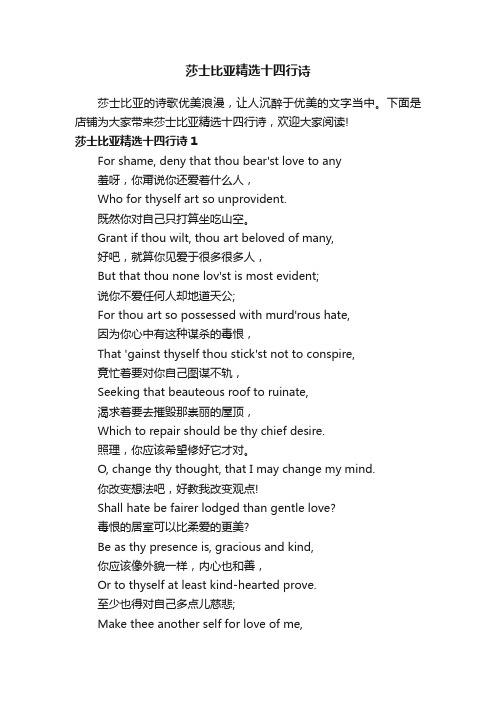
莎士比亚精选十四行诗莎士比亚的诗歌优美浪漫,让人沉醉于优美的文字当中。
下面是店铺为大家带来莎士比亚精选十四行诗,欢迎大家阅读!莎士比亚精选十四行诗1For shame, deny that thou bear'st love to any羞呀,你甭说你还爱着什么人,Who for thyself art so unprovident.既然你对自己只打算坐吃山空。
Grant if thou wilt, thou art beloved of many,好吧,就算你见爱于很多很多人,But that thou none lov'st is most evident;说你不爱任何人却地道天公;For thou art so possessed with murd'rous hate,因为你心中有这种谋杀的毒恨,That 'gainst thyself thou stick'st not to conspire,竟忙着要对你自己图谋不轨,Seeking that beauteous roof to ruinate,渴求着要去摧毁那崇丽的屋顶,Which to repair should be thy chief desire.照理,你应该希望修好它才对。
O, change thy thought, that I may change my mind.你改变想法吧,好教我改变观点!Shall hate be fairer lodged than gentle love?毒恨的居室可以比柔爱的更美?Be as thy presence is, gracious and kind,你应该像外貌一样,内心也和善,Or to thyself at least kind-hearted prove.至少也得对自己多点儿慈悲;Make thee another self for love of me,你爱我,就该去做另一个自身,That beauty still may live in thine or thee.使美在你或你后代身上永存。
莎士比亚经典十四行诗附译文

莎士比亚经典十四行诗附译文莎士比亚十四行诗结构技巧和语言技巧都很高,每首诗都有独立的审美价值,让人沉醉于优美的文字当中。
下面是店铺为大家带来莎士比亚经典十四行诗附译文,希望大家喜欢!莎士比亚经典十四行诗一Love is too young to know what conscience is;Yet who knows not conscience is born of love?Then, gentle cheater, urge not my amiss,Lest guilty of my faults thy sweet self prove:For, thou betraying me, I do betrayMy nobler part to my gross body's treason;My soul doth tell my body that he mayTriumph in love; flesh stays no father reason;But, rising at thy name, doth point out theeAs his triumphant prize. Proud of this pride,He is contented thy poor drudge to be,To stand in thy affairs, fall by thy side.No want of conscience hold it that I callHer 'love' for whose dear love I rise and fall.莎士比亚经典十四行诗译文爱神太年轻,不懂得良心是什么;但谁不晓得良心是爱情所产?那么,好骗子,就别专找我的错,免得我的罪把温婉的你也牵连。
因为,你出卖了我,我的笨肉体又哄我出卖我更高贵的部分;我灵魂叮嘱我肉体,说它可以在爱情上胜利;肉体再不作声,一听见你的名字就马上指出你是它的胜利品;它趾高气扬,死心蹋地作你最鄙贱的家奴,任你颐指气使,或倒在你身旁。
十四行诗116-威廉·莎士比亚
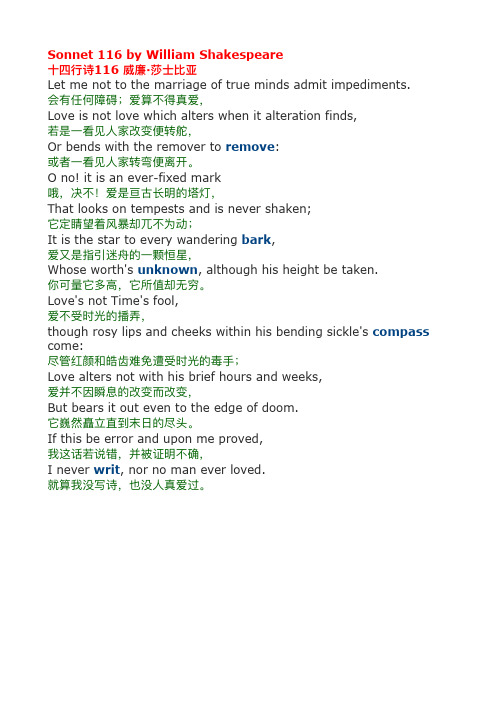
Sonnet 116 by William Shakespeare⼗十四⾏行行诗116 威廉·莎⼠士⽐比亚Let me not to the marriage of true minds admit impediments. 会有任何障碍;爱算不不得真爱,Love is not love which alters when it alteration finds,若是⼀一看⻅见⼈人家改变便便转舵,Or bends with the remover to remove:或者⼀一看⻅见⼈人家转弯便便离开。
O no! it is an ever-fixed mark哦,决不不!爱是亘古⻓长明的塔灯,That looks on tempests and is never shaken;它定睛望着⻛风暴暴却⺎兀兀不不为动;It is the star to every wandering bark,爱⼜又是指引迷⾈舟的⼀一颗恒星,Whose worth's unknown, although his height be taken.你可量量它多⾼高,它所值却⽆无穷。
Love's not Time's fool,爱不不受时光的播弄弄,though rosy lips and cheeks within his bending sickle's compass come:尽管红颜和皓⻮齿难免遭受时光的毒⼿手;Love alters not with his brief hours and weeks,爱并不不因瞬息的改变⽽而改变,But bears it out even to the edge of doom.它巍然矗⽴立直到末⽇日的尽头。
If this be error and upon me proved,我这话若说错,并被证明不不确,I never writ, nor no man ever loved.就算我没写诗,也没⼈人真爱过。
莎士比亚十四行诗精选
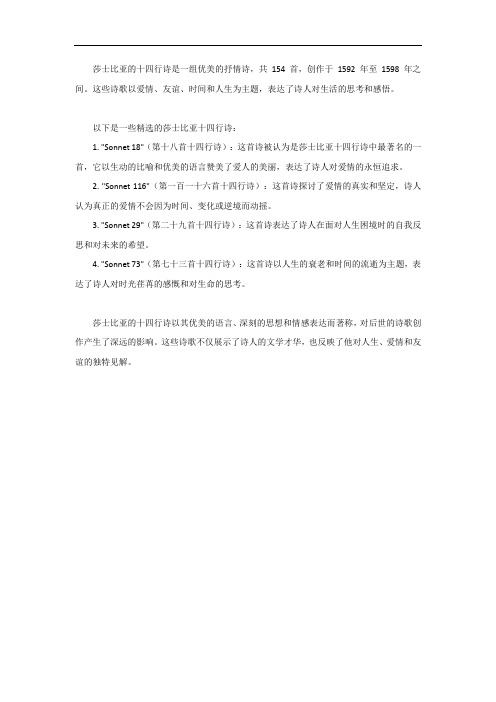
莎士比亚的十四行诗是一组优美的抒情诗,共154 首,创作于1592 年至1598 年之间。
这些诗歌以爱情、友谊、时间和人生为主题,表达了诗人对生活的思考和感悟。
以下是一些精选的莎士比亚十四行诗:
1. "Sonnet 18"(第十八首十四行诗):这首诗被认为是莎士比亚十四行诗中最著名的一首,它以生动的比喻和优美的语言赞美了爱人的美丽,表达了诗人对爱情的永恒追求。
2. "Sonnet 116"(第一百一十六首十四行诗):这首诗探讨了爱情的真实和坚定,诗人认为真正的爱情不会因为时间、变化或逆境而动摇。
3. "Sonnet 29"(第二十九首十四行诗):这首诗表达了诗人在面对人生困境时的自我反思和对未来的希望。
4. "Sonnet 73"(第七十三首十四行诗):这首诗以人生的衰老和时间的流逝为主题,表达了诗人对时光荏苒的感慨和对生命的思考。
莎士比亚的十四行诗以其优美的语言、深刻的思想和情感表达而著称,对后世的诗歌创作产生了深远的影响。
这些诗歌不仅展示了诗人的文学才华,也反映了他对人生、爱情和友谊的独特见解。
得不到的爱和星星——SidneySonnet1|十首十四行诗

得不到的爱和星星——SidneySonnet1|十首十四行诗嗨大家好,我们的十首十四行诗今天读到第二天啦,给大家试读第一天的内容。
新平台会每天更新一首十四行诗的图文内容+Bunny的音频+诗歌双语对照图片。
感兴趣的读友可以点文末“阅读原文”参加十首诗的共读哦。
1(Sir Philip Sidney, from: Astrophil and Stella)大家好今天我们读Sir Philip Sidney十四行诗集Astrophil and Stella《爱星者与星》的Sonnet 1。
诗集名字和诗集的中文译者都是曹明伦。
我们先看到这个诗集的英文名字是Astrophil and Stella,两个人的名字,但是翻译的题目为爱星者与星,这是为什么呢?——原来这两个名字来自希腊语,Stella 斯黛拉这个名字的原意是星星,Astrophil由'aster' (star) 和'phil' (lover)两个希腊词语组成,意思是爱星星的人。
爱星星的人,摸得到星星吗?——一个在地球上,一个在银河系里,所以说,标题充满了爱情的甜蜜和求而不得的失落感。
求而不得的爱unrequited love, 是传统十四行诗经常表达的重要主题。
大家说,莎士比亚十四行诗有这个主题吗?现在我们来欣赏一下这首诗的形式,Bunny已经在中英对照图片上把押韵格式标出来了,它们是abab abab cdcd ee, 从押韵格式可以看出来,前八行分两个部分,每部分四行,但是因为它们押韵格式相同,所以前八行的内容联系一定很紧密。
另外9~12行为一个单位,最后的couplet为一个单位。
需要注意的是,连续用两个abab的押韵格式,比用abab cdcd 格式难度更大——因为得同时找到4个a押韵的词语,4个b押韵的词语,在这首诗中诗人找的是:Show know woe flow 为aPain obtain entertain brain 为b 现在我们看到内容部分前两个四行Q1+Q2或者我们也可以叫它前八行Octave这首诗的前一个quatrain我经常用在我妈身上:办公众号的初衷是为了让我妈了解文学。
第十四行诗130-威廉·莎士比亚
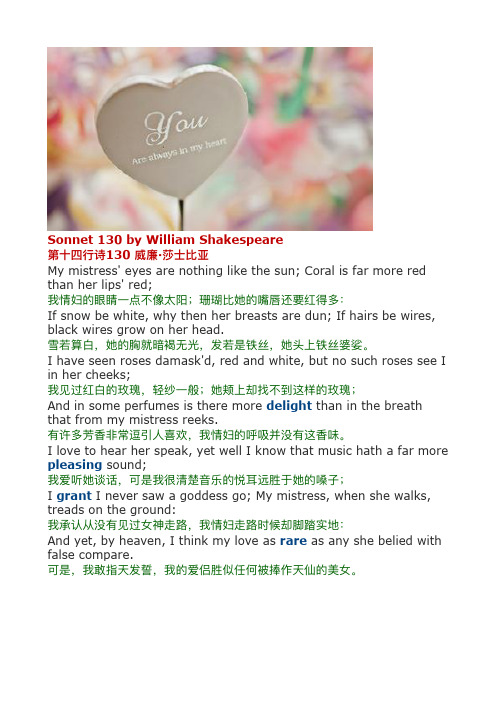
Sonnet 130 by William Shakespeare第⼗十四⾏行行诗130 威廉·莎⼠士⽐比亚My mistress' eyes are nothing like the sun; Coral is far more red than her lips' red;我情妇的眼睛⼀一点不不像太阳;珊瑚⽐比她的嘴唇还要红得多:If snow be white, why then her breasts are dun; If hairs be wires, black wires grow on her head.雪若算⽩白,她的胸就暗褐⽆无光,发若是铁丝,她头上铁丝婆娑。
I have seen roses damask'd, red and white, but no such roses see I in her cheeks;我⻅见过红⽩白的玫瑰,轻纱⼀一般;她颊上却找不不到这样的玫瑰;And in some perfumes is there more delight than in the breath that from my mistress reeks.有许多芳⾹香⾮非常逗引⼈人喜欢,我情妇的呼吸并没有这⾹香味。
I love to hear her speak, yet well I know that music hath a far more pleasing sound;我爱听她谈话,可是我很清楚⾳音乐的悦⽿耳远胜于她的嗓⼦子;I grant I never saw a goddess go; My mistress, when she walks, treads on the ground:我承认从没有⻅见过⼥女女神⾛走路路,我情妇⾛走路路时候却脚踏实地:And yet, by heaven, I think my love as rare as any she belied with false compare.可是,我敢指天发誓,我的爱侣胜似任何被捧作天仙的美⼥女女。
精选莎士比亚十四行诗

精选莎士比亚十四行诗莎士比亚的诗歌优美浪漫,让人沉醉于优美的文字当中。
下面是店铺为大家带来精选莎士比亚十四行诗,欢迎大家阅读!精选莎士比亚十四行诗1Music to hear, why hear'st thou music sadly?你是音乐,为什么悲哀地听音乐?Sweets with sweets war not, joy delights in joy.甜蜜不忌甜蜜,欢笑爱欢笑。
Why lov'st thou that which thou receiv'st not gladly,为什么你不愉快地接受喜悦?Or else receiv'st with pleasure thine annoy?要不然,你就高兴地接受苦恼?If the true concord of well tuned sounds,假如几种入调的声音合起来By unions married, do offend thine ear,成了真和谐,教你听了不乐,They do but sweetly chide thee, who confounds那它只是美妙地责备你不该In singleness the parts that thou shouldst bear.守独身而把你应守的本分推脱。
Mark how one string, sweet husband to another,听一根弦儿,另一根的好丈夫,听,Strikes each in each by mutual ordering;一根拨响了一根应,琴音谐和;Resembling sire, and child, and happy mother,正如父亲、儿子和快乐的母亲,Who all in one, one pleasing note do sing;合成一体,唱一支动听的歌:Whose speechless song, being many, seeming one,他们那没词儿的歌,都异口同声,Sings this to thee, 'Thou single wilt prove none.' 对你唱:“你独身,将要一事无成。
SONNET莎士比亚十四行诗全文
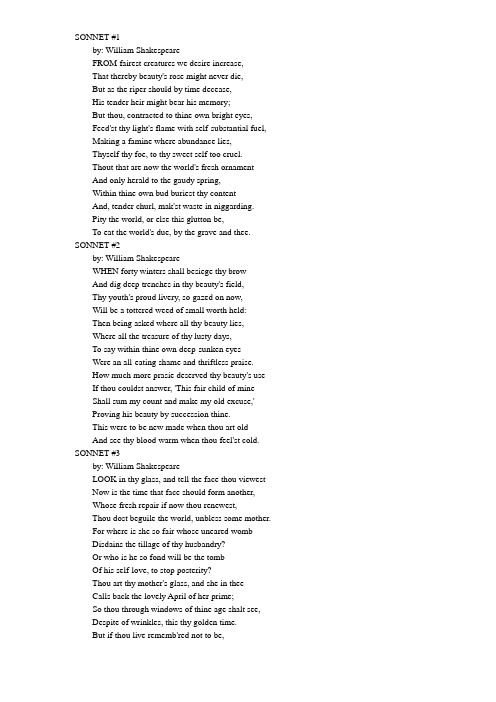
SONNET #1by: William ShakespeareFROM fairest creatures we desire increase,That thereby beauty's rose might never die,But as the riper should by time decease,His tender heir might bear his memory;But thou, contracted to thine own bright eyes,Feed'st thy light's flame with self-substantial fuel,Making a famine where abundance lies,Thyself thy foe, to thy sweet self too cruel.Thout that are now the world's fresh ornamentAnd only herald to the gaudy spring,Within thine own bud buriest thy contentAnd, tender churl, mak'st waste in niggarding.Pity the world, or else this glutton be,To eat the world's due, by the grave and thee. SONNET #2by: William ShakespeareWHEN forty winters shall besiege thy browAnd dig deep trenches in thy beauty's field,Thy youth's proud livery, so gazed on now,Will be a tottered weed of small worth held:Then being asked where all thy beauty lies,Where all the treasure of thy lusty days,To say within thine own deep-sunken eyesWere an all-eating shame and thriftless praise.How much more prasie deserved thy beauty's useIf thou couldst answer, 'This fair child of mineShall sum my count and make my old excuse,'Proving his beauty by succession thine.This were to be new made when thou art oldAnd see thy blood warm when thou feel'st cold. SONNET #3by: William ShakespeareLOOK in thy glass, and tell the face thou viewestNow is the time that face should form another,Whose fresh repair if now thou renewest,Thou dost beguile the world, unbless some mother.For where is she so fair whose uneared wombDisdains the tillage of thy husbandry?Or who is he so fond will be the tombOf his self-love, to stop posterity?Thou art thy mother's glass, and she in theeCalls back the lovely April of her prime;So thou through windows of thine age shalt see,Despite of wrinkles, this thy golden time.But if thou live rememb'red not to be,Die single, and thine image dies with thee. SONNET #4by: William ShakespeareUNTHRIFTY loveliness, why dost thou spendUpon thyself they beauty's legacy?Nature's bequest gives nothing but doth lend,And, being frank, she lends to those are free.Then, beateous niggard, why dost thou abuseThe bounteous largess given thee to give?Profitless userer, why dost thou useSo great a sum of sums, yet canst not live?For, having traffic with thyself alone,Thou of thyself thy sweet self dost deceive:Then how, when Nature calls thee to be gone,What acceptable audit canst thou leave?Thy unused beauty must be tombed with thee,Which, usèd, lives th' executor to be.SONNET #5by: William ShakespeareTHOSE hours that with gentle work did frameThe lovely gaze where every eye doth dwellWill play the tyrants to the very sameAnd that unfair which fairly doth excel;For never-resting time leads summer onTo hideous winter and confounds him there,Sap checked with frost and lusty leaves quite gone,Beauty o'ersnowed and bareness everywhere.Then, were not summer's distillation leftA liquid prisoner pent in walls of glass,Beauty's effect with beauty were bereft,Nor it nor no remembrance what it was:But flowers distilled, though they with winter meet,Leese but there snow; their substance still lives sweet. SONNET #6by: William ShakespeareTHEN let not winter's ragged hand defaceIn thee thy summer ere thou be distilled:Make sweet some vial; treasure thou some placeWith beauty's treasure ere it be self-killed.That use is not forbidden usuryWhich happies those that pay the willing loan;That's for thyself to breed another thee,Or ten times happier be it ten for one.Ten times thyself were happier than thou art,If ten of thine ten times refigured thee:Then what could death do if thou shouldst depart,Leaving thee living in posterity?Be not self-willed, for thou art much too fairTo be death's conquest and make worms thine heir. SONNET #7by: William ShakespeareLO, in the orient when the gracious lightLifts up his burning head, each under eyeDoth homage to his new-appearing sight,Serving with looks his sacred majesty;And having climbed the steep-up heavenly hill,Resembling strong yough in his middle age,Yet mortal looks adore his beauty still,Attending on his golden pilgrimage;But when from highmost pitch, with weary car,Like feeble age he reeleth from the day,The eyes, fore duteous, now converted areFrom his low tract and look another way:So thou, thyself outgoing in thy noon,Unlooked on diest unless thou get a son. SONNET #8by: William ShakespeareMUSIC to hear, why hear'st thou music sadly?Sweets with sweets war not, joy delights in joy:Why lov'st thou that which thou receiv'st not gladly, Or else receiv'st with pleasure thine annoy?If the true concord of well-tunèd sounds,By unions married, do offend thine ear,They do but sweetly chide thee, who confoundsIn singleness the parts that thou shouldst bear.Mark how one string, sweet husband to another,Strikes each in each by mutual ordering;Resembling sire and child and happy mother,Who, all in one, one pleasing note do sing;Whose speechless song, being many, seeming one,Sings this to thee, 'Thou single wilt prove none.' SONNET #9by: William ShakespeareIS it for fear to wet a widow's eyeThat thou consum'st thyself in single life?Ah, if thou issueless shalt hap to die,The world will wail thee like a makeless wife;The world will be thy widow, and still weepThat thou no form of thee hast left behind,When every private widow well may keep,By children's eyes, her husband's shape in mind.Look what an unthrift in the world doth spendShifts but his place, for still the world enjoys it;But beauty's waste hath in the world an end,And, kept unused, the user so destroys it:No love toward others in that bosom sitsThan on himself such murd'rous shame commits SONNET #10by: William ShakespeareFOR shame, deny that thou bear'st love to anyWho for thyself art so unprovident:Grant, if thou wilt, thou art beloved of many,But that thou none lov'st is most evident;For thou art so possessed with murd'rous hateThat 'gainst thyself thou stick'st not to conspire,Seeking that beauteous roof to ruinateWhich to repair should be thy chief desire.O, change thy thought, that I may change my mind;Shall hate be fairer lodged than gentle love?Be as thy presence is, gracious and kind,Or to thyself at least kind-hearted prove:Make thee another self for love of me,That beauty still may live in thine or thee.SONNET #11by: William ShakespeareAS fast as thou shalt wane, so fast thou grow'stIn one of thine, from that which thou departest;And that fresh blood which youngly thou bestow'stThou mayst call thine when thou from youth convertest.Herein lives wisdom, beauty, and increase;Without this, folly, age, and cold decay.If all were minded so, the times should cease,And threescore year would make the world away.Let those whom Nature hath not made for store,Harsh, featureless, and rude, barrenly perish:Look whom she best endowed she gave the more,Which bounteous gift thou shouldst in bounty cherish.She carved thee for her seal, and meant therebyThou shouldst print more, not let that copy die. SONNET #12by: William ShakespeareWHEN I do count the clock that tells the timeAnd see the brave day sunk in hideous night,When I behold the violet past primeAnd sable curls all silvered o'er with white,When lofty trees I see barren of leaves,Which erst from heat did canopy the herd,And summer's green all girded up in sheavesBorne on the bier with white and bristly beard;Then of thy beauty do I question makeThat thou among the wastes of time must go,Since sweets and beauties do themselves forsakeAnd die as fast as they see others grow;And nothing 'gainst Time's scythe can make defense Save breed, to brave him when he takes thee hence. SONNET #13by: William ShakespeareO , THAT you were yourself, but, love, you areNo longer yours than you yourself here live:Against this coming end you should prepare,And your sweet semblance to some other give.So should that beauty which you hold in leaseFind no determination; then you wereYourself again after yourself's deceaseWhen your sweet issue your sweet form should bear.Who lets so fair a house fall to decay,Which husbandry in honor might upholdAgainst the stormy gusts of winter's dayAnd barren rage of death's eternal cold?O, none but unthrifts! Dear my love, you knowYou had a father -- let your son say so.SONNET #14by: William ShakespeareNOT from the stars do I my judgment pluck,And yet methinks I have astronomy;But not to tell of good or evil luck,Of plagues, of dearths, or season's quality;Nor can I fortune to brief minutes tell,Pointing to each his thunder, rain, and wind,Or say with princes if it shall go wellBy oft predict that I in heaven find;But from thine eyes my knowledge I derive,And, constant stars, in them I read such artAs truth and beauty shall together thriveIf from thyself to store thou wouldst convert:Or else of thee this I prognosticate,Thy end is truth's and beauty's doom and date. SONNET #15by: William ShakespeareWHEN I consider everything that growsHolds in perfection but a little moment,That this huge stage presenteth nought but showsWhereon the stars in secret influence comment;When I perceive that men as plants increase,Cheerèd and checked even by the selfsame sky,V aunt in their youthful sap, at height decrease,And wear their brave state out of memory:Then the conceit of this inconstant staySets you most rich in youth before my sight,Where wasteful Time debateth with DecayTo change your day of youth to sullied night;And, all in war with Time for love of you,As he takes from you, I ingraft you new.SONNET #16by: William ShakespeareBUT wherefore do not you a mightier wayMake war upon this bloody tyrant, Time?And fortify yourself in your decayWith means more blessèd than my barren rime?Now stand you on the top of happy hours,And many maiden gardens, yet unset,With virtuous wish would bear your living flowers,Much liker than your painted counterfeit:So should the lines of life that life repairWhich this time's pencil or my pupil pen,Neither in inward worth nor outward fairCan make you live yourself in eyes of men.To give away yourself keeps yourself still,And you must live, drawn by your own sweet skill."Sonnet #16" was originally published in Shake-speares Sonnets: Never before Imprinted (1609).SONNET #17by: William ShakespeareHO will believe my verse in time to comeIf it were filled with your most high deserts?Though yet, heaven knows, it is but as a tombWhich hides your life and shows not half your parts.If I could write the beauty of your eyesAnd in fresh numbers number all your graces,The age to come would say, 'This poet lies--Such heavenly touches ne'er touched earthly faces.'So should my papers, yellowed with their age,Be scorned, like old men of less truth than tongue,And your true rights be termed a poet's rageAnd stretchèd metre of an antique song.But were some child of yours alive that time,You should live twice--in it and in my rime."Sonnet #17" was originally published in Shake-speares Sonnets: Never before Imprinted (1609).SONNET #18by: William ShakespeareShall I compare thee to a summer's day?Thou art more lovely and more temperate.Rough winds do shake the darling buds of May,And summer's lease hath all too short a date.Sometime too hot the eye of heaven shines,And often is his gold complexion dimmed;And every fair from fair sometime declines,By chance, or nature's changing course, untrimmed:But thy eternal summer shall not fadeNor lose possession of that fair thou ow'st,Nor shall Death brag thou wand'rest in his shadeWhen in eternal lines to time thou grow'st.So long as men can breathe or eyes can see,So long lives this, and this gives life to thee."Sonnet #18" was originally published in Shake-speares Sonnets: Never before Imprinted (1609).SONNET #19by: William ShakespeareDevouring time, blunt thou the lion's paws,And make the earth devour her own sweet brood;Pluck the keen teeth from the fierce tiger's jaws,And burn the long-lived phoenix in her blood;Make glad and sorry seasons as they fleet'st,And do whate'er thou wilt, swift-footed Time,To the wide world and all her fading sweets,But I forbid thee one most heinous crime:O, carve not with thy hours my love's fair brow,Nor draw no lines there with thine antique pen;Him in thy course untainted do allowFor beauty's pattern to succeeding men.Yet do thy worst, old Time: despite thy wrong,My love shall in my verse ever live young."Sonnet #19" was originally published in Shake-speares Sonnets: Never before Imprinted (1609).SONNET #20by: William Shakespeare (1564-1616)WOMAN'S face, with Nature's own hand painted,Hast thou, the master-mistress of my passion;A woman's gentle heart, but not acquaintedWith shifting change, as is false women's fashion;An eye more bright than theirs, less false in rolling,Gilding the object whereupon it gazeth;A man in hue all hues in his controlling,Which steals men's eyes and women's souls amazeth.And for a woman wert thou first created,Till Nature as she wrought thee fell a-doting,And by addition me of thee defeatedBy adding one thing to my purpose nothing.But since she pricked thee out for women's pleasure,Mine be thy love, and thy love's use their treasure."Sonnet #20" was originally published in Shake-speares Sonnets: Never before Imprinted(1609).SONNET #21by: William Shakespeare (1564-1616)O is it not with me as with that MuseStirred by a painted beauty to his verse,Who heaven itself for ornament doth useAnd every fair with his fair doth rehearse;Making a couplement of proud compareWith sun and moon, with earth and sea's rich gems,With April's first-born flowers, and all things rareThat heaven's airs in this huge rondure hems.O let me, true in love, but truly write,And then believe me, my love is as fairAs any mother's child, though not so brightAs those gold candles fixed in heaven's air:Let them say more that like of hearsay well;I will not praise that purpose not to sell."Sonnet #21" was originally published in Shake-speares Sonnets: Never before Imprinted (1609).SONNET #22by: William Shakespeare (1564-1616)MY glass shall not persuade me I am oldSo long as youth and thou are of one date;But when in thee time's furrows I behold,Then look I death my days should expiate.For all that beauty that doth cover theeIs but the seemly raiment of my heart,Which in they breast doth live, as thine in me:How can I then be elder than thou art?O therefore, love, be of thyself so waryAs I, not for myself, but for thee will,Bearing thy heart, which I will keep so charyAs tender nurse her babe from faring ill.Presume not on thy heart when mine is slain;Thou gav'st me thine not to give back again."Sonnet #22" was originally published in Shake-speares Sonnets: Never before Imprinted (1609).SONNET #23by: William Shakespeare (1564-1616)AS an unperfect actor on the stage,Who with his fear is put besides his part,Or some fierce thing replete with too much rage,Whose strength's abundance weakens his own heart;So I, for fear of trust, forget to sayThe perfect ceremony of love's rite,And in mine own love's strength seem to decay,O'ercharged with burden of mine own love's might.O, let my books be then the eloquenceAnd dump presagers of my speaking breast,Who plead for love, and look for recompense,More than that tongue that more hath more expressed.O, learn to read what silent love hath writ:To hear with eyes belongs to love's fine wit."Sonnet #23" was originally published in Shake-speares Sonnets: Never before Imprinted (1609).SONNET #24by: William Shakespeare (1564-1616)MINE eye hath played the painter and hath stelledThy beauty's form in table of my heart;My body is the frame wherein 'tis held,And perspective it is best painter's art.For through the painter must you see his skillTo fine where your true image pictured lies,Which in my bosom's shop is hanging still,That hath his windows glazèd with thine eyes.Now see what good turns eyes for eyes have done:Mine eyes have drawn thy shape, and thine for meAre windows to my breast, wherethrough the sunDelights to peep, to gaze therein on thee.Yet eyes this cunning want to grace their art;They draw but what they see, know not the heart."Sonnet #24" was originally published in Shake-speares Sonnets: Never before Imprinted (1609).SONNET #25by: William Shakespeare (1564-1616)LET those who are in favor with their starsOf public honor and proud titles boast,Whilst I, whom fortune of such triumph bars,Unlooked for joy in that I honor most.Great princes' favorites their fair leaves spreadBut as the marigold at the sun's eye;And in themselves their pride lies burièd,For at a frown they in their glory die.The painful warrior famousèd for fight,After a thousand victories once foiled,Is from the book of honor rasèd quite,And all the rest forgot for which he toiled.Then happy I, that love and am belovedWhere I may not remove nor be removed."Sonnet #25" was originally published in Shake-speares Sonnets: Never before Imprinted (1609).SONNET #26by: William Shakespeare (1564-1616)LORD of my love, to whom in vassalageThy merit hath my duty strongly knit,To thee I send this written ambassageTo witness duty, not to show my wit;Duty so great, which wit so poor as mineMay make seem bare, in wanting words to show it,But that I hope some good coneit of thineIn thy soul's thought, all naked, will bestow it;Till whatsoever star that guides my movingPoints on me graciously with fair aspect,And puts apparel on my tottered lovingTo show me worthy of thy sweet respect:Then may I dare to boast how I do love thee;Till then not show my head where thou mayest prove me."Sonnet #26" was originally published in Shake-speares Sonnets: Never before Imprinted (1609).SONNET #27by: William Shakespeare (1564-1616)WEARY with toil, I haste to my bed,The dear repose for limbs with travel tired,But then begins a journey in my headTo work my mind when body's work's expired;For then my thoughts, from far where I abide,Intend a zealous pilgrimage to thee,And keep my drooping eyelids open wide,Looking on darkness which the blind do see;Save that my soul's imaginary sightPresents thy shadow to my sightless view,Which, like a jewel hung in ghastly night,Makes black night beauteous and her old face new.Lo, thus, by day my limbs, by night my mind,For thee and for myself no quiet find."Sonnet #27" was originally published in Shake-speares Sonnets: Never before Imprinted (1609).SONNET #28by: William Shakespeare (1564-1616)HOW can I then return in happy plightThat am debarred the benefit of rest,When day's oppression is not eased by night,And each, though enemies to either's reign,Do in consent shake hands to torture me,The one by toil, the other to complainHow far I toil, still farther off from thee?I tell the day, to please him, thou art brightAnd dost him grace when clouds do blot the heaven;So flatter I the swart-complexioned night,When sparkling stars twire not, thou gild'st the even.But day doth daily draw my sorrows longer,And night doth nightly make grief's strength seem stronger."Sonnet #28" was originally published in Shake-speares Sonnets: Never before Imprinted (1609).SONNET #29by: William Shakespeare (1564-1616)WHEN, in disgrace with Fortune and men's eyes,I all alone beweep my outcast state,And trouble deaf heaven with my bootless cries,And look upon myself and curse my fate,Wishing me like to one more rich in hope,Featured like him, like him with friend's possessed,Desiring this man's art, and that man's scope,With what I most enjoy contented least;Yet in these thoughts myself almost despising,Haply I think on thee, and then my state,Like to the lark at break of day arisingFrom sullen earth, sings hymns at heaven's gate;For thy sweet love rememb'red such wealth bringsThat then I scorn to change my state with kings."Sonnet #29" was originally published in Shake-speares Sonnets: Never before Imprinted (1609).SONNET #30by: William Shakespeare (1564-1616)WHEN to the sessions of sweet silent thoughtI summon up remembrance of things past,I sigh the lack of many a thought I sought,And with old woes new wail my dear time's waste:Then can I drown an eye, unused to flow,For precious friends hid in death's dateless night,And weep afresh love's long since cancelled woe,And moan th' expense of many a vanished sight.Then can I grieve at grievances foregone,And heavily from woe to woe tell o'erThe sad account of fore-bemoanèd moan,Which I new pay as if not paid before.But if the while I think on thee, dear friend,All losses are restored and sorrows end."Sonnet #30" was originally published in Shake-speares Sonnets: Never before Imprinted (1609).SONNET #31by: William Shakespeare (1564-1616)THY bosom is endearèd with all heartsWhich I by lacking have supposèd dead;And their reigns love, and all love's loving parts,And all those friends which I thought burièd.How many a holy and obsequious tearHath dear religious love stol'n from mine eye,As interest of the dead, which now appearBut things removed that hidden in thee lie!Thou art the grave where buried love doth live,Hung with the trophies of my lovers gone,Who all their parts of me to thee did give;That due of many now is thine alone.Their images I loved I vew in thee,And thou, all they, hast all the all of me."Sonnet #31" was originally published in Shake-speares Sonnets: Never before Imprinted (1609).SONNET #32by: William Shakespeare (1564-1616)IF thou survive my well-contented dayWhen that churl Death my bones with dust shall cover,And shalt by fortune once more resurveyThese poor rude lines of thy deceasèd lover,Compare them with the bett-ring of the time,And though they be outstripped by every pen,Reserve them for my love, not for their rime,Exceeded by the height of happier men.O, then vouchsafe me but this loving thought:'Had my friend's Muse grown with this growing age,A dearer birth than this his love had broughtTo march in ranks of better equipage;But since he died, and poets better prove,Theirs for their style I'll read, his for his love.'。
shakespeare(sonnet) 英国文学 十四行诗
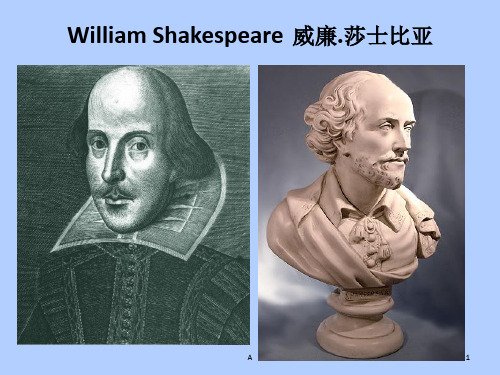
A
1
Who is Shakespeare?
A
2
艾汶河上斯特拉斯福:莎翁故居及塑像
A
3
莎翁部分作品:Some Works
A
4
Poems
• Poems: • I narrative: ballad, epic • II dramatic: dramatic monologue • III lyric (dealing with emotions, feelings): sonnet, ode,
happiness eyes
thine
yours the possessive pronoun
Verbs after second person subject should end with (e)st thou would(e)st thou hast thou wast thou didst thou singest thou growest
• The rhyme scheme is as follows: First stanza (quatrain): ABAB; Second stanza (quatrain): CDCD; Third stanza (quatrain): EFEF; Couplet: GG.
A
12
Early Modern English Grammar
A
11
Rime scheme
• Petrarchan (Italian) rime scheme: abba, abba, cd, cd, cd abba, abba, cde, cde
• The Shakespearean (English, or Elizabethan) sonnet is also called the English sonnet, with three four-line stanzas (quatrains) and a two-line unit called a couplet (对子).
莎士比亚的第十八首十四行诗

莎士比亚的第十八首十四行诗莎士比亚的第18首十四行诗是他的一首著名Sonnet(十四行诗),以下是该诗的原文:Shall I compare thee to a summer's day? Thou art more lovely and more temperate: Rough winds do shake the darling buds of May, And summer's lease hath all too short a date: Sometime too hot the eye of heaven shines, And often is his gold complexion dimmed; And every fair from fair sometime declines, By chance or nature's changing course untrimmed; But thy eternal summer shall not fade Nor lose possession of that fair thou owest; Nor shall Death brag thou wanderest in his shade, When in eternal lines to time thou growest: So long as men can breathe or eyes can see, So long lives this, and this gives life to thee.这首诗是一首表达爱情赞美的十四行诗,诗人将心爱之人与夏日做了比较,认为她比夏天更加美丽和温和,不会随着时间的流逝而变淡,也不会被死亡所征服,因为她将永远存在于这首诗中。
这首诗以其深情而著名,被广泛阅读和欣赏。
莎士比亚十四行诗
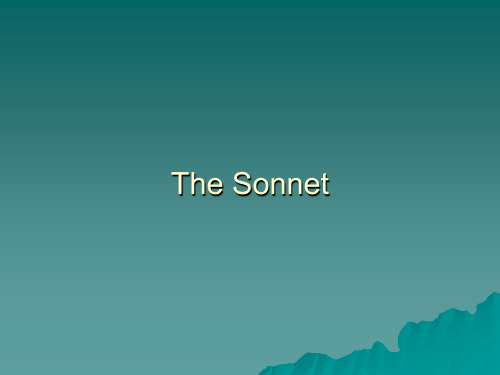
A sonnet is
a
lyric poem consisting of fourteen lines written in iambic pentameter with a definite rime scheme and a definite thought structure
Edmund Spenser, Amoretti, Sonnet 75
Rime scheme
Petrarchan (Italian) (彼特拉克)rime scheme: abba, abba, cd, cd, cd abba, abba, cde, cde
Shakespearean (English, or Elizabethan) rime scheme: abab, cdcd, efef, gg
1st Quatrain
Sonnet 73
The speaker is Part of life lived the spring and summer the morning and noon The ashes of youth The whole of life the year the day hour
Q1 Q2 Q3
in the fall of his life in the twilight of the day In the glowing coals
Year
Time is rapidly shortening.
Day
Hour
That time is running out is what the beloved perceives.
Sonnet 73
That time of year thou mayst in me behold Year - Fall When yellow leaves, or none, or few, do hang Upon those boughs which shake against the cold, Bare ruined choirs, where late the sweet birds sang. 2nd Quatrain In me thou see'st the twilight of such day Day - Twilight As after sunset fadeth in the west; Which by and by black night doth take away, Death's second self, that seals up all in rest. rd Quatrain 3 In me thou see'st the glowing of such fire, Fire - Coals That on the ashes of his youth doth lie, As the death-bed, whereon it must expire, Consum'd with that which it was nourish'd by. This thou perceiv'st, which makes thy love more strong, “This” is ll.1-12 To love that well, which thou must leave ere long.
莎士比亚十四行诗精选

莎士比亚十四行诗精选From fairest creatures we desire increase,我们要美丽的生命不断繁息,That thereby beauty's rose might never die,能这样,美的玫瑰才永不消亡,But as the riper should by time decease,既然成熟的东西都不免要谢世,His tender heir might bear his memory;优美的子孙就应当来承继芬芳:But thou contracted to thine own bright eyes,但是你跟你明亮的眼睛结了亲,Feed'st thy light's flame with self-substantial fuel,把自身当柴烧,烧出了眼睛的光彩,Making a famine where abundance lies,这就在丰收的地方造成了饥馑,Thyself thy foe, to thy sweet self too cruel.你是跟自己作对,教自己受害。
Thou that art now the world's fresh ornament,如今你是世界上鲜艳的珍品,And only herald to the gaudy spring,只有你能够替灿烂的春天开路,Within thine own bud buriest thy content,你却在自己的花蕾里埋葬了自身,And, tender churl, mak'st waste in niggarding.温柔的怪物呵,用吝啬浪费了全部。
Pity the world, or else this glutton be,可怜这世界吧,世界应得的东西To eat the world's due, by the grave and thee.别让你和坟墓吞吃到一无所遗!When forty winters shall besiege thy brow,四十个冬天将围攻你的额角,And dig deep trenches in thy beauty's field,将在你美的田地里挖浅沟深渠,Thy youth's proud livery so gazed on now,你青春的锦袍,如今教多少人倾倒,Will be a tottered weed of small worth held:将变成一堆破烂,值一片空虚。
十四行诗18英文赏析-莎士比亚[整理版]
![十四行诗18英文赏析-莎士比亚[整理版]](https://img.taocdn.com/s3/m/faf35c37bdd126fff705cc1755270722192e59c0.png)
莎士比亚的第18首十四行诗的英文赏析我能否将你比作夏天?你比夏天更美丽温婉。
狂风将五月的蓓蕾凋残,夏日的勾留何其短暂。
休恋那丽日当空,转眼会云雾迷蒙。
休叹那百花飘零,催折于无常的天命。
唯有你永恒的夏日常新,你的美貌亦毫发无损。
死神也无缘将你幽禁,你在我永恒的诗中长存。
只要世间尚有人吟诵我的诗篇,这诗就将不朽,永葆你的芳颜。
这首诗的艺术特点首先是在于它有着双重主题:一是赞美诗人爱友的美貌,二是歌颂了诗歌艺术的不朽力量。
其次就是诗人在诗中运用了新颖的比喻,但又自然而生动。
Sonnet 18, often alternately titled Shall I compare thee to a summer's day?, is one of the best-known of 154 sonnets written by the English playwright and poet William Shakespeare. Part of the Fair Y outh sequence (which comprises sonnets 1-126 in the accepted numbering stemming from the first edition in 1609), it is the first of the cycle after the opening sequence now described as the Procreation sonnets. Most scholars now agree that the original subject of the poem, the beloved to whom the poet is writing, is a male, though the poem is commonly used to describe a woman.In the sonnet, the poet compares his beloved to the summer season, and argues that his beloved is better. The poet also states that his beloved will live on forever through the words of the poem. Scholars have found parallels within the poem to Ovid's Tristia and Amores, both of which have love themes. Sonnet 18 is written in the typical Shakespearean sonnet form, having 14 lines of iambic pentameter ending in a rhymed couplet. Detailed exegeses have revealed several double meanings within the poem, giving it a greater depth of interpretation.Sonnet 18 is a typical English or Shakespearean sonnet. It consists of three quatrains followed by a couplet, and has the characteristic rhyme scheme: abab cdcd efef gg. The poem carries the meaning of an Italian or Petrarchan Sonnet. Petrarchan sonnets typically discussed the love and beauty of a beloved, often an unattainable love, but not always.[5] It also contains a volta, or shift in the poem's subject matter, beginning with the third quatrain.A facsimile of the original printing of Sonnet 18.The poem starts with a line of adoration to the beloved—"Shall I compare thee to a summer's day?" The speaker then goes on to say that the beloved being described is both "more lovely and more temperate" than a summer's day. Thespeaker lists some things that are negative about summer. It is too short—"summer's lease hath all too short a date"—and sometimes the sun shines too hot—"Sometime too hot the eye of heaven shines." However, the beloved being described has beauty that will last forever, unlike the fleeting beauty of a summer's day. By putting his love's beauty into the form of poetry, the poet is preserving it forever by the power of his written words. "So long as men can breathe, or eyes can see, So long lives this, and this gives life to thee." The hope is that the two lovers can live on, if not through children, then through the poems brought forth by their love which, unlike children, will not fadeA major feature of this poem - analogy. Begins with the first sentence, put "you" and "Summer" as a analogy, compare the second line of the initial determination: Are you more lovely than the summer, more gentle. The difference is due to produce its in-depth analysis of 3 to 14 lines. Specifically, the first line of 3.4.5.6.7.8 enumerated the "summer" all kinds of regrets, and 9.10.11.12.13.14 line tells the "you" all kinds of advantages compared to the natural draw a final conclusion: "Y ou" is far better than "Summer," "you" because in his poetry between the lines but also has a life, and time forever. Also noteworthy is the verse 13 and 14 are also, by analogy emphasized the "eternal nature."Throughout the poem, the poet freely to the "you" talk, it seems that "you" is a living person, to listen to his voice, understanding his thinking. So this poem can be said to be people in the application of techniques based on the written. The poem "Y ou" refers to an object, academia, there are two explanations, one view is that it refers to beauty, and the other that it refers to poetry to express the good things. Now most scholars prefer the latter.One of the best known of Shakespeare’s sonnets, Sonnet 18 is memorable for the skillful and varied presentation of subject matter, in which the poet’s feelings reach a level of rapture unseen in the previous sonnets. The poet here abandons his quest for the youth to have a child, and instead glories in the youth’s beauty.On the surface, the poem is simply a statement of praise about the beauty of the beloved; summer tends to unpleasant extremes of windiness and heat, but the beloved is always mild and temperate. Summer is incidentally personified as the "eye of heaven" with its "gold complexion"; the imagery throughout is simple and unaffected, with the "darling buds of May" giving way to the "eternal summer", which the speaker promises the beloved. The language, too, is comparatively unadorned for the sonnets; it is not heavy with alliteration or assonance, and nearly every line is its own self-contained clause--almost every line ends with some punctuation, which effects a pause.Initially, the poet poses a question―”Shall I compare thee to a summer’s day?”―and then reflects on it, remarking that the youth’s beauty far surpasses summer’s delights. The imagery is the very essence of simplic ity: “wind”and “buds.”In the fourth line, legal terminology―”summer’s lease”―is introduced in contrast to the commonplace images in the first three lines. Note also the poet’s use of extremes in the phrases “more lovely,”“all too short,”and “too hot”; these phrases emphasize the young man’s beauty.Although lines 9 through 12 are marked by a more expansive tone and deeper feeling, the poetreturns to the simplicity of the opening images. As one expects in Shakespeare’s sonnets, the proposition that the poet sets up in the first eight lines―that all nature is subject to imperfection―is now contrasted in these next four lines beginning with “But.”Although beauty naturally declines at some point―”And every fair from fair sometime declines”―the youth’s beauty will not; his unchanging appearance is atypical of nature’s steady progression. Even death is impotent against the youth’s beauty. Note the ambiguity in the phrase “eternal lines”: Are these “lines”the poet’s verses or the youth’s hoped-for children? Or are they simply wrinkles meant to represent the process of aging? Whatever the answer, the poet is jubilant in this sonnet because nothing threatens the young man’s beautiful appearance.Sonnet 18 is the first poem in the sonnets not to explicitly encourage the young man to have children. The "procreation" sequence of the first 17 sonnets ended with the speaker's realization that the young man might not need children to preserve his beauty; he could also live, the speaker writes at the end of Sonnet 17, "in my rhyme." Sonnet 18, then, is the first "rhyme"--the speaker's first attempt to preserve the young man's beauty for all time. An important theme of the sonnet (as it is an important theme throughout much of the sequence) is the power of the speaker's poem to defy time and last forever, carrying the beauty of the beloved down to future generations. The beloved's "eternal summer" shall not fade precisely because it is embodied in the sonnet: "So long as men can breathe or eyes can see," the speaker writes in the couplet, "So long lives this, and this gives life to thee."大多数莎学家认为,是作者赞美好友的超常之美的。
莎士比亚十四行诗带翻译

莎士比亚十四行诗带翻译莎士比亚的十四行诗语汇丰富、用词洗练、比喻新颖、结构巧妙、音调铿锵悦耳、张弛有度,让人印象深刻。
下面是店铺为大家带来莎士比亚十四行诗带翻译,供大家阅读欣赏!莎士比亚十四行诗1Then let not winter's ragged hand deface你还没提炼出香精,那你就别让In thee thy summer ere thou be distilled.严冬的粗手来抹掉你脸上的盛夏:Make sweet some vial; treasure thou some place你教玉瓶生香吧;用美的宝藏With beauty's treasure ere it be self-killed.使福地生光吧,趁它还没有自杀。
That use is not forbidden usury取这种重利并不是犯禁放高利贷,Which happies those that pay the willing loan;它能够教愿意还债的人们高兴;That's for thyself to breed another thee,这正是要你生出另一个你来,Or ten times happier be it ten for one.或高兴十倍,要是你一人生十人;Ten times thyself were happier than thou art,你十个儿女描画你十幅肖像,If ten of thine ten times refigured thee:你就要比你独个儿添十倍欢乐:Then what could death do if thou shouldst depart,你将来去世时,死神能把你怎样,Leaving thee living in posterity?既然在后代身上你永远存活?Be not self-willed, for thou art much too fair,别刚愎自用,你太美丽了,不应该To be death's conquest and make worms thine heir.让死神掳去、教蛆虫做你的后代。
